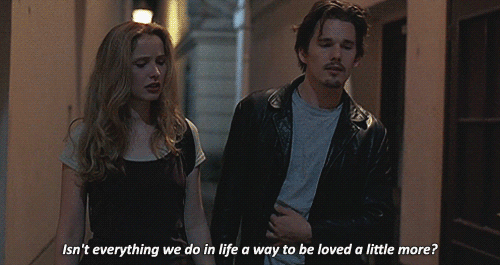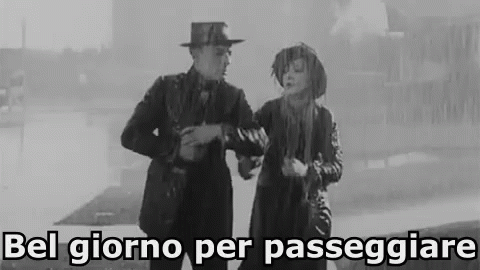Walking around, walking around and "because yes", means much more than just walking around. We say by parts, then, the existential mathematics of slowness, the uncertainty of the non-sense and the contemplation of the strangest art: grace. How to analyze so many things? Starting from a beautiful Italian concept: make a passeggiata.
Make a passggiata
Legend has it that in Königsberg (now Kaliningrad) the citizens adjusted the time of their watch according to the walks of the methodical Immanuel Kant (yes, that of the "Categorical imperative" and I don't know how much), who walked out every day at the same time, always punctual and without exceptions. In fact, they were so confident that if their needles were to mark that this gentleman had left later, they attributed the cause to late watches. But we'll travel somewhere else now. In London, a man pursues, even obsession, an elderly decrepit among the crowd, according to Poe's account. Why do you do it? Well, because your walk doesn't make a particular sense. And a destiny more. In Arlés, at night and at the edge of the Rhône River, a couple of lovers walk around contemplating the lights of the stars and the buildings in a Van Gogh painting.- Yeah.Are these characters the protagonists? Or is it the action of walking, the better, the eye of the subject in these cases?
Walk for walking and without an apparent fate. Deambular? What's important? Well, I recently met with a concept that could give us a kick to think:"Make a passeggiata", the night ritual of Italians consistent in taking a walk after dinner, preferably in company of someone else. "Passeggiata", walk, the act of going slower (and more attentive, more curious) than what goes from one place to another. And for what? Well, to this custom are attributed all kinds of benefits, from losing weight to sleeping better. And yet, "do a passeggiata" does not exhaust itself in its positive impact on the health of those who carry it out, it is a ritual that goes far beyond (and less evil). Let's continue, I say, let's stop, to the passeggiata, this word that besides sounding well is more interesting than it seems.
Sense
First, the sense. When I investigated this habit on Google, I noticed that people reduce it to its consequences, which is called "the Italian secret" to lower dinner, "the ones under the sleeve" to be healthier. And what happens to the during? Because I say, beyond the future projection, the present has to have some weight. Why does it cost us so much to enjoy the periods? Why can't we live without feeling the need to find a particular sense? Yes, of course taking a clean walk to mind and reduces stress, but its meaning is not merely that. In fact, to prove it, we will make a mixture of languages in this case necessary. In French it is known as flâneurs to people who walk around without an apparent course, with no other intention than to waste time. If we take into account that usually people across the street are heading towards a particular destination, the flâneur is a kind of camouflaged character among the crowd that, while mixing, somehow observes from outside at the same time. Vendria to be like a "be part of" while it is "beyond"; in fact, in the midst of my short but entertained research on these walks based on nothing, I found myself with an excellent way to describe the flânerie: for Honoré de Balzac (a French novelist) it is "gastronmia for the eyes". Of course we could say that "observing" is a possible sense and that, in any case, a simple walk can derive in a sociological analysis. However, I think with "gastronomy" Balzac is referring to something else, especially considering that "no direction" can even go beyond the lack of geographical location, and it is a lack of "rumbo" in the sense of precisely and valga the redundancy, the lack of determined-certain meaning.

Lentitude
The second, slowness. In the romantic movies there is always a nightly stroller and most of the time it seems that the characters would like to stretch the moment to enjoy it even more. There is even a novel by Milan Kundera that associates the slowness to memory in a kind of "existential mathematics" which states, in his words, that"the degree of slowness is directly proportional to the intensity of memory; the degree of speed is directly proportional to the intensity of oblivion".Indeed, and if to walk it is, the flânerie, which deambula, which performs a passeggiata (it is suddenly mixed all languages), is not concerned with speed because it does not have a fixed destination or a time up there. He has nothing and paradoxically has all the time in the world, at least during his walk (because the night belongs to lovers, said Patti Smith). Lentitude. Time for conversation and observation amidst a path, passeggiatas sometimes more reminiscently than the destinations from which we departed and those to whom we addressed.

Grace
The third, the grace. Giving "a passeggiata out there" implies not knowing exactly what you will find and yet feel the need to do it in all ways and because yes. Of course, if we respect the Italian habit of doing it after dinner, probably the ride is decore with stars and lights, and we well know that nights bring a certain share of mysticism to what happens. But decoration is not grace and grace has to be something else. In my opinion, it may be a matter of opening up a kind of space or "bitch" within what it seems already closed: the destinations, the streets, the speeds in automatic. Nothing of the closed is pertinent in a passeggiata, what matters is better development, what develops, the prolongation of a moment. The results of the passeggiata (diminution of anxiety, acceleration of metabolism, a clean mind) are mere consequences, but not the end: grace, precisely, is that the passeggiata is not a means for an end, but rather the end in itself. That's all, that's all. There is no need to reduce the mystery of things to its consequences, no one cares where we are going exactly on this tour and, despite that, what pleasant would be to make a block more, two blocks more, to prolong this slow and senseless moment.
What about tonight? What are you gonna do after dinner?
Do you want to validate this article?
By validating, you are certifying that the published information is correct, helping us fight against misinformation.
ethel rosso
Psychologist (MN 81203). Buenos Aires.
I like to do yoga, read, and go for long walks. Sometimes I write because I am too curious.
You can also find me on my Instagram @psicologa.ethelrosso.




Comments